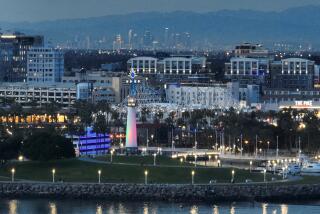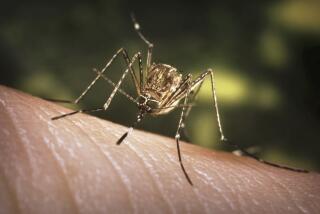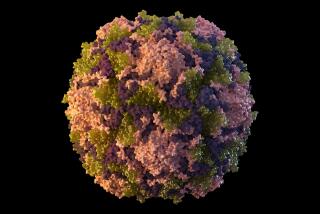New York officials reassure city as man tests positive for Ebola
- Share via
Reporting from New York — Ebola turned up in the nation’s largest city Thursday when a Manhattan doctor who had treated victims of the deadly virus in Africa tested positive for it, less than a month after Ebola killed one person and sickened two nurses in Texas.
The patient, identified as Dr. Craig Allen Spencer, had been working with the medical aid group Doctors Without Borders in Guinea, one of three West African countries hit hardest by the Ebola outbreak. More than 4,800 people are thought to have died in West Africa since the first case was detected in December.
Spencer, 33, was in isolation and intensive care at Bellevue Hospital in Manhattan late Thursday. One of three people known to have had contact with him also was in isolation at Bellevue, being watched for possible symptoms of Ebola.
None of the three was showing signs of illness, said Dr. Mary Bassett, the city’s health commissioner. A fourth person, an Uber driver, also had been contacted but was considered at very low risk of exposure.
At a news conference, a grim-faced Mayor Bill de Blasio, flanked by Gov. Andrew Cuomo and Bassett, urged New Yorkers not to worry about contracting the virus, which is spread only through contact with bodily fluids after a person becomes symptomatic.
“We want to state at the outset, there is no reason for New Yorkers to be alarmed,” de Blasio said. “Ebola is a very hard disease to contract.”
But the arrival of Ebola in a city of more than 8 million people who rub shoulders daily on subways, buses and overcrowded sidewalks seemed likely to arouse concern after the missteps that ensued on Sept. 25 when a Liberian man came to a Dallas emergency room with Ebola symptoms and was sent away with a prescription for antibiotics.
That man, Thomas Eric Duncan, was admitted during his second trip to the ER on Sept. 28 and died Oct. 8. Two nurses who treated him fell ill and are hospitalized – one at Emory University Hospital in Atlanta, the other at the National Institutes of Health in Bethesda, Md. Both appear to be recovering.
“I know it’s a frightening situation,” Cuomo said. “That it’s here in New York, it is more frightening. New York is a dense place … a lot of people on top of each other.”
The case also raises anew the question of how healthcare workers who have treated Ebola victims should isolate themselves and avoid mingling in public spaces before the virus’ 21-day incubation period expires.
One of the two nurses who caught Ebola from Duncan, Amber Vinson, flew on a commercial jet from Dallas to Cleveland and back again, going to the hospital the day after her return. Airline officials had to contact hundreds of fellow passengers to alert them to be on the lookout for Ebola symptoms, which include fever, nausea and body aches.
After Vinson’s diagnosis, Dr. Thomas Frieden, director of the U.S. Centers for Disease Control and Prevention, said she should not have flown even though her fever when she boarded the jet in Ohio was not high enough to be considered alarming. Her family has said she had the CDC’s permission to make the trip.
Spencer spent most of his time in his apartment after returning to the United States from Guinea on Oct. 17, Bassett said. But he did go out, she said, riding at least three of the city’s subway lines, taking an Uber cab, and going bowling in Brooklyn with friends on Wednesday.
“He was being mindful of his contact with people. He was very alert to signs and symptoms of Ebola,” Bassett said, adding that he would not have been contagious until he became feverish.
She said Spencer reported feeling fatigued earlier in the week, but he was taking his temperature twice daily and did not report a spike until Thursday morning, when he had a fever of about 103.
That was sometime between 10 and 11 a.m.
Spencer called the Doctors Without Borders’ New York office, which alerted the city’s health department. EMS and Fire Department officials went to Spencer’s apartment wearing heavy-duty personal protective gear.
They put him into an ambulance, which sped through a cold rain toward Bellevue under police escort.
Officials described it as a smooth operation that had been months in the planning, since Ebola began ravaging West Africa and the CDC began issuing alerts to U.S. hospitals to be on the lookout for patients.
“The past few weeks, we’ve been preparing for just this circumstance,” said Cuomo, who last week designated Bellevue as one of eight state hospitals to handle Ebola or possible Ebola patients. Those hospitals have staff specially trained in the use of personal protective gear and rooms for patients to remain in isolation. “We can’t say this is an unexpected circumstance.”
The CDC said it would perform more tests to confirm the diagnosis.
Spencer’s online profile describes him as a fellow of international emergency medicine at Columbia University-New York Presbyterian Hospital. The hospital said he had not been to work since his return from West Africa because of the recommended 21-day self-monitoring period.
Even before Spencer’s results came back, city officials had sealed his apartment, visited other residents of the building, and fanned out across his neighborhood handing out Ebola information fliers in Spanish and in English.
“The goal now is to make sure people don’t panic,” said Mark Levine, the city councilman who represents the area.
New York’s response was in stark contrast to the situation in Dallas last month when Duncan became the first person diagnosed with Ebola in the United States.
De Blasio said Spencer’s early reporting of his symptoms was key. “We have seen time and time again that when a case is caught early, a great deal can be done to resolve it. And certainly we do know for sure … it was caught very early.”
New York officials say they have been operating under the assumption that an Ebola case would turn up here, because of the population size and the number of international flights arriving daily. About half of all passengers coming to the United States from Liberia, Guinea or Sierra Leone in a one-year period ending last July arrived at John F. Kennedy International Airport in New York, the CDC said.
Spencer arrived at JFK three days after flying out of Guinea on Oct. 14. He traveled via Europe, but because he was feeling healthy and showing no symptoms during his trips, health experts said there was virtually no chance others on his flights were exposed to the virus.
The CDC said it already had a team of Ebola experts in New York, and was sending more.
“Three members of CDC’s Ebola Response Team will arrive in New York City tonight,” the agency said in a statement. “This team is deployed when an Ebola case is identified in the United States, or when health officials have a very strong suspicion that a patient has Ebola pending lab results.”
The CDC experts had been there assessing Bellevue’s readiness, the statement said, and “found the facility to be well prepared to care for a patient with Ebola.”
tina.susman@latimes.com
More to Read
Sign up for Essential California
The most important California stories and recommendations in your inbox every morning.
You may occasionally receive promotional content from the Los Angeles Times.














